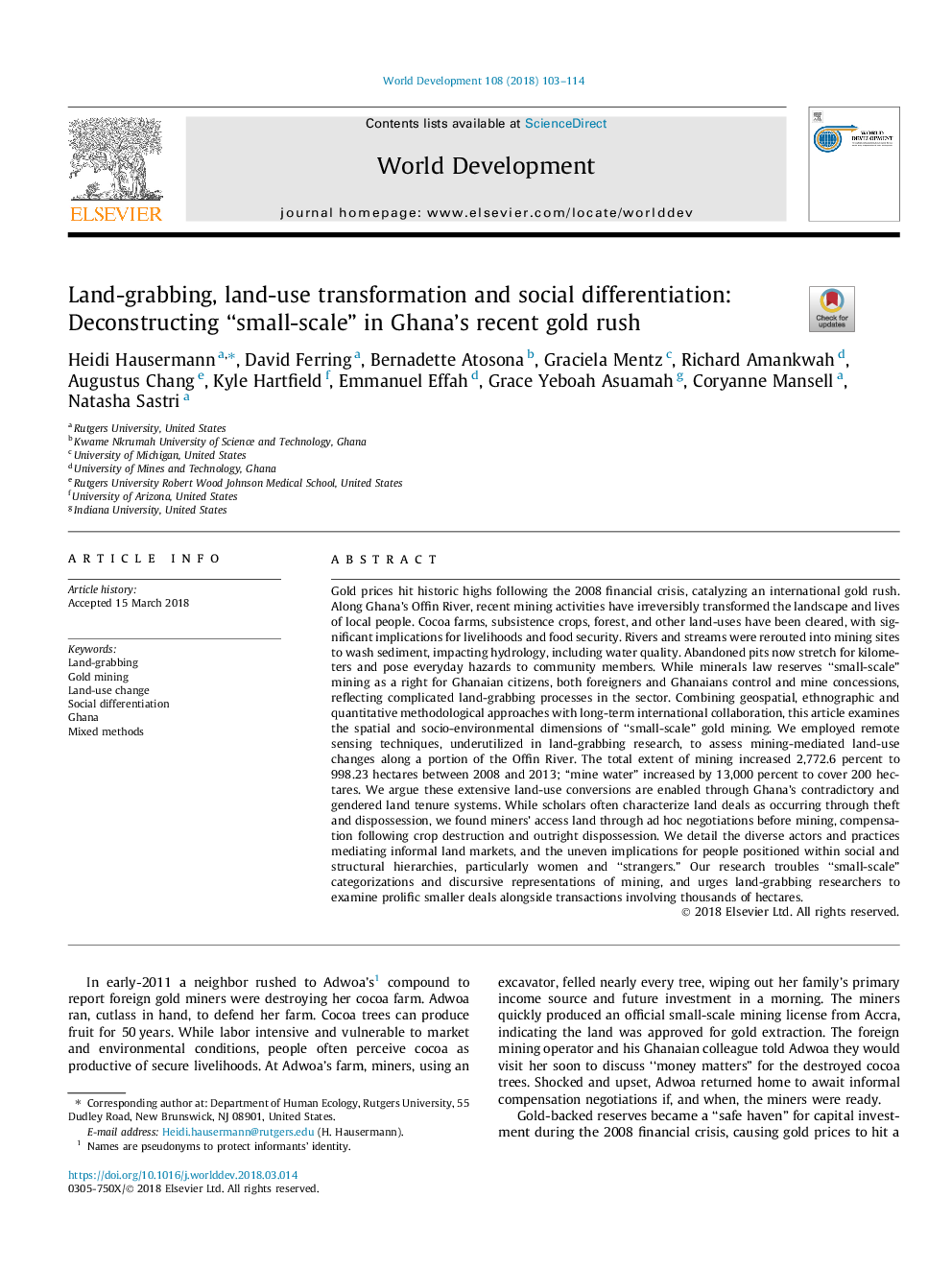| کد مقاله | کد نشریه | سال انتشار | مقاله انگلیسی | نسخه تمام متن |
|---|---|---|---|---|
| 7391702 | 1481110 | 2018 | 12 صفحه PDF | دانلود رایگان |
عنوان انگلیسی مقاله ISI
Land-grabbing, land-use transformation and social differentiation: Deconstructing “small-scale” in Ghana's recent gold rush
ترجمه فارسی عنوان
زمین گیر شدن، تبدیل زمین به زمین و تفکیک اجتماعی: ساختن مقیاس کوچک در عجله طلا اخیر طلای غنا
دانلود مقاله + سفارش ترجمه
دانلود مقاله ISI انگلیسی
رایگان برای ایرانیان
کلمات کلیدی
گرفتن زمین، استخراج طلا، تغییر کاربری زمین، تمایز اجتماعی، غنا، روش های متفرقه،
موضوعات مرتبط
علوم انسانی و اجتماعی
اقتصاد، اقتصادسنجی و امور مالی
اقتصاد و اقتصادسنجی
چکیده انگلیسی
Gold prices hit historic highs following the 2008 financial crisis, catalyzing an international gold rush. Along Ghana's Offin River, recent mining activities have irreversibly transformed the landscape and lives of local people. Cocoa farms, subsistence crops, forest, and other land-uses have been cleared, with significant implications for livelihoods and food security. Rivers and streams were rerouted into mining sites to wash sediment, impacting hydrology, including water quality. Abandoned pits now stretch for kilometers and pose everyday hazards to community members. While minerals law reserves “small-scale” mining as a right for Ghanaian citizens, both foreigners and Ghanaians control and mine concessions, reflecting complicated land-grabbing processes in the sector. Combining geospatial, ethnographic and quantitative methodological approaches with long-term international collaboration, this article examines the spatial and socio-environmental dimensions of “small-scale” gold mining. We employed remote sensing techniques, underutilized in land-grabbing research, to assess mining-mediated land-use changes along a portion of the Offin River. The total extent of mining increased 2,772.6 percent to 998.23 hectares between 2008 and 2013; “mine water” increased by 13,000 percent to cover 200 hectares. We argue these extensive land-use conversions are enabled through Ghana's contradictory and gendered land tenure systems. While scholars often characterize land deals as occurring through theft and dispossession, we found miners' access land through ad hoc negotiations before mining, compensation following crop destruction and outright dispossession. We detail the diverse actors and practices mediating informal land markets, and the uneven implications for people positioned within social and structural hierarchies, particularly women and “strangers.” Our research troubles “small-scale” categorizations and discursive representations of mining, and urges land-grabbing researchers to examine prolific smaller deals alongside transactions involving thousands of hectares.
ناشر
Database: Elsevier - ScienceDirect (ساینس دایرکت)
Journal: World Development - Volume 108, August 2018, Pages 103-114
Journal: World Development - Volume 108, August 2018, Pages 103-114
نویسندگان
Heidi Hausermann, David Ferring, Bernadette Atosona, Graciela Mentz, Richard Amankwah, Augustus Chang, Kyle Hartfield, Emmanuel Effah, Grace Yeboah Asuamah, Coryanne Mansell, Natasha Sastri,
